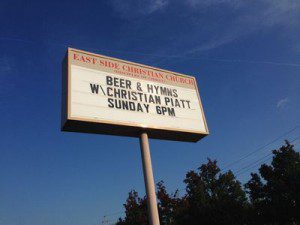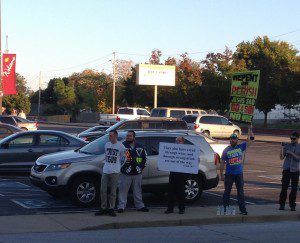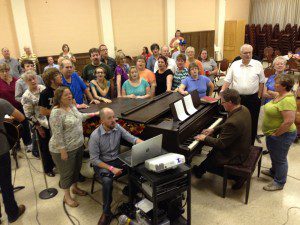“Do not suppose that abuses are eliminated by destroying the object which is abused. Men can go wrong with wine and women. Shall we then prohibit and abolish women?”
-Martin Luther
 You all know by now that I’ve been on a national tour, talking about my latest book, “postChristian: What’s Left? Can We Fix It? Do We Care?” I knew that it would raise a few hackles along the way; after all, the first line in the book offers fair warning that at least parts of the contents will piss you off.
You all know by now that I’ve been on a national tour, talking about my latest book, “postChristian: What’s Left? Can We Fix It? Do We Care?” I knew that it would raise a few hackles along the way; after all, the first line in the book offers fair warning that at least parts of the contents will piss you off.
True to form, when I arrived at a University in California to speak, they informed me that a number of my posters around campus had been torn down. Of course I could chalk this up to ideological controversy, but I prefer to think that it was jealous boyfriends acting in a fit of rage because their girlfriends had suddenly lost all interest in them after encountering my rather dashing head shot.
I had another interesting exchange in the upper midwest at another school, where a very staunchly conservative evangelical Christian student and the president of the Secular Society literally huddled together and joined forces against my challenges on certainty. This, I thought, was particularly fascinating, especially since it precisely reinforced my point that our addiction to certitude is so fierce that we actually hold it in higher regard (ie, idolize) than our actual beliefs.
Funny, but they didn’t seem to have the same appreciation of the irony of it all.
But none of this can compare to the drama that awaited me when I got to Tulsa for my three-day trek around the land of the Sooners. And interestingly, it had nothing to do with the audacious claims I make in the book or the history of provocative content I’ve offered on my blog over the years. The culprit this time was beer. 3.2% beer, at that. But the scandal of it all was that we served it (GASP!) in church.
For the last two years, we’ve been hosting a monthly Beer and Hymns event at First Christian Church in Portland, OR. We picked up the idea from a related event done annually at the Wild Goose Festival in North Carolina, which was, in turn, borrowed from a Beer and Hymns event that takes place at the Greenbelt Festival across the pond. Our event has made it’s own share of news, getting some airtime from NPR and a local TV station, but none of it was quite as sensational as we got in Tulsa.
 For starters, they had the sign (see above) posted outside of East Side Christian Church for a few days to let people know about the event. That’s when a local news station picked up the story and decided to air something on their evening news program. This, in turn, got picked up by CNN and then shared on local news affiliates on their evening news shows all over the country. And of course, this prompted a feeding frenzy back in Tulsa for all of the news stations who hadn’t been the first to report on it. So the night of the event, we had four news cameras there to cover Beer and Hymns.
For starters, they had the sign (see above) posted outside of East Side Christian Church for a few days to let people know about the event. That’s when a local news station picked up the story and decided to air something on their evening news program. This, in turn, got picked up by CNN and then shared on local news affiliates on their evening news shows all over the country. And of course, this prompted a feeding frenzy back in Tulsa for all of the news stations who hadn’t been the first to report on it. So the night of the event, we had four news cameras there to cover Beer and Hymns.
Oh, and we also had some protesters who picketed outside with their Westboro-Baptist-like signs and name-calling theatrics. I should note, too, that we had one brave counter-protester who showed up midway through the event with his own sign that read: I SUPPORT BEER.
All of this because we offered people the option of having a low-point beer in the fellowship hall of a church while signing some old hymns together. So scandalous.
So why do it? As I’ve said before, if I told folks we were doing a hymn sing at church on a weekend night, you might get a few blue-hairs to show up, but that’s about it. Folks would (reasonably so) have a handful of assumptions about the event, most of which would revolve around the word BO-RING.
 But this is much more than a publicity stunt too. On many levels at once, it challenges assumptions about Christianity as a whole, breaking open a fresh and vibrant conversation about what it means to be in community with those seeking to follow Jesus. For those outside of church, it tells them that whatever is going on inside, it ain’t what you think. It’s breaking down barriers of expectation so that we can engage in more mindful, real community with each other, rather than doing the same old thing with the same old usual suspects, over and over again.
But this is much more than a publicity stunt too. On many levels at once, it challenges assumptions about Christianity as a whole, breaking open a fresh and vibrant conversation about what it means to be in community with those seeking to follow Jesus. For those outside of church, it tells them that whatever is going on inside, it ain’t what you think. It’s breaking down barriers of expectation so that we can engage in more mindful, real community with each other, rather than doing the same old thing with the same old usual suspects, over and over again.
It also challenges those within the church to consider what they may find so objectionable about having beer in church. For example, in my own church, many of those who took issue with the event drink at home and in public, and have even served us wine and beer in their homes. It’s something specifically about it being done in church that they struggle with. So this has given us a rich opportunity to talk about the delicate balance between sacred “set aside” space and our ongoing efforts to break down barriers, creating more opportunities for those who may have previously felt unwelcome to join us at the ever-expanding table.
Some folks assume that this temperance attitude toward all of “demon alcohol” is one that has deep historic roots within the Christian faith, but that’s actually not true. For one, it’s fairly unique to North America; Christians in other parts of the world don’t have the same puritanical hangups as we do about it. In fact, Christians in the 1800s regularly celebrated together with alcoholic drinks, as they considered it to be symbolic of the extravagant blessings from a gracious and bountiful God.
Oh, and for the record, most Catholics and Anglicans totally don’t get the issue at all. I actually went to a kegger picnic once at an Episcopal church, and Catholics use sacramental wine as an essential element of worship. And at every Jewish Passover meal I’ve ever taken part in (which is a lot), there is not only wine involved; the pouring and drinking of four glasses each is part of the annual ritual.
The current stridency against “strong drink” seems to have emerged both from the Christian support of the Prohibition back in the very early 20th Century, and further reinforced by movements such as the Moral Majority, which came to prominence during the most recent theocratic marriage between evangelical Christians and the Republican party.
Just goes to show what a terribly short historical memory we Americans tend to have, especially when it’s expedient to lean on such collective amnesia.
So yes, we served a couple of beers to those who chose to partake, after checking their IDs and assessing their sobriety. We held the event in the fellowship hall, which welcomed at least 100 people who raised the roof with us in a spirit of community, worship and celebration. They were given permission to – God forbid – have fun in church, whether they drank or not. And kids joined along, sipping a soda and coloring with their friends when not singing with the grownups.
No one threw up. No one denounced the baby Jesus. No one got hurt. And from what I could tell, everyone had a good time, though only about half of the adults in attendance actually drank anything.
Finally, to those who suggest that we shouldn’t dare to serve alcohol in church when there are those among us struggling with addiction. Might I point out that, though the Christian Church is replete with food addicts, no one blinks at holding yet another dessert auction or perilously unhealthy potluck. Nadia Bolz Weber, a pastor in Denver, actually hosts a Beer and Hymns events for her church and she doesn’t drink. Jay Bakker doesn’t drink either, and yet he holds his church services in a bar in Minneapolis.
There’s this thing that Paul talked about as a virtue of the Spirit called self control. It is something that, like any spiritual gift, must be exercised and practiced with some real discipline. But that’s hard; much harder than simply railing against a glass of fermented barley and hops.
Silly Christians.











